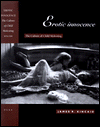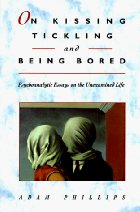…or some random sources that I am finding as I wrap up my thoughts/discoveries from last semester and ponder what to include in my classes for next semester.
Before I begin all of the “actual” work that I have slated for the next month (betwixt and between the fall and spring semesters–hmm…a liminal space, perhaps?), I am taking some time to explore different ideas. I have always loved the part of research when you just travel from source to source and track the connections that authors make between their ideas and the work of others. I used to spend hours in the library scanning the shelves, picking out books with interesting titles, scrutinizing the footnotes for further sources and then tracking those sources down. Now I do it on my computer through google books or amazon or E-Journals while I am drinking my latte and eating my chocolate zucchini bread at Anodyne. I miss the smells and sounds of the library (so I still do that too), but I think it is so cool that I can do research anywhere (and at anytime–even at 2 AM when I can’t sleep). Anyway, I am sitting here at Andoyne (having just briefly visited Wilson Library), thinking about troublemaking, queer theory, feminist theory, Foucault, children and childishness, and affect/emotion.
 I went to Wilson Library to pick up James Kincaid’s Erotic Innocence: The Culture of Child Molesting. I found him though his essay in Curiouser. This book, particularly his chapter, “Inventing the Child–and Sexuality,” seems important for me to read as I think through the dominant narratives of the Child as innocent (and a/pre-sexual). Before I actually started reading the book, I was struck by one of his epigraphs. Well, maybe not the epigraph, but its source : Adam Phillip’s On Kissing, Tickling, and Being Bored: Psychoanalytic Essays on the Unexamined Life. I tracked it down through google books and previewed it. Here is part of the book overview:
I went to Wilson Library to pick up James Kincaid’s Erotic Innocence: The Culture of Child Molesting. I found him though his essay in Curiouser. This book, particularly his chapter, “Inventing the Child–and Sexuality,” seems important for me to read as I think through the dominant narratives of the Child as innocent (and a/pre-sexual). Before I actually started reading the book, I was struck by one of his epigraphs. Well, maybe not the epigraph, but its source : Adam Phillip’s On Kissing, Tickling, and Being Bored: Psychoanalytic Essays on the Unexamined Life. I tracked it down through google books and previewed it. Here is part of the book overview:
Psychoanalysis began as a virtuoso improvisation within the science of medicine, but virtuosity has given way to the dream of science that only the examined life is worth living. Phillips shows that the drive to omniscience has been unfortunate both for psychoanalysis and for life. On Kissing, Tickling, and Being Bored is a set of meditations on underinvestigated themes in psyochoanalysis that shows how much one’s psychic health depends on establishing a realm of life that successfully resists examination.
 I love this idea of unknowingness as central to a successful life (reminds of Judith Butler in Undoing Gender). After I check out the book and skim it closely, I will have to reflect on Phillips’ ideas in relation to Socrates and his oft cited mantra: “The unexamined life is not worth living.” I was also want to spend some time reading Philips’ chapter, “Worrying and its discontents.” In my last entry I wrote about the link, which seems to be inextricably drawn, between worry, thinking and trouble. I am wondering, when is worrying a valuable enterprise? When is it too much? What exactly is it? Before my google preview ran out (because you can only preview a limited number of pages–perhaps I should look for the exact “rules” somewhere on the google books site), I was able to read this intriguing description: worries are farts that don’t work (47). I am reminded of my queering theory class and our (very) productive, especially for one student, focus on the connection between the abject and shit. If worry is a fart, or the failure to shit, what purpose does it serve? Are farts the in-between the subject and the abject? Wow. I should stop before I go too far here….
I love this idea of unknowingness as central to a successful life (reminds of Judith Butler in Undoing Gender). After I check out the book and skim it closely, I will have to reflect on Phillips’ ideas in relation to Socrates and his oft cited mantra: “The unexamined life is not worth living.” I was also want to spend some time reading Philips’ chapter, “Worrying and its discontents.” In my last entry I wrote about the link, which seems to be inextricably drawn, between worry, thinking and trouble. I am wondering, when is worrying a valuable enterprise? When is it too much? What exactly is it? Before my google preview ran out (because you can only preview a limited number of pages–perhaps I should look for the exact “rules” somewhere on the google books site), I was able to read this intriguing description: worries are farts that don’t work (47). I am reminded of my queering theory class and our (very) productive, especially for one student, focus on the connection between the abject and shit. If worry is a fart, or the failure to shit, what purpose does it serve? Are farts the in-between the subject and the abject? Wow. I should stop before I go too far here….
Okay, that’s enough writing about books; now I want to read them!

Comments are closed.